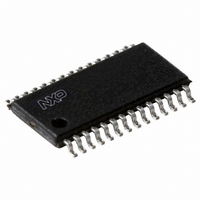P89LPC931FDH,112 NXP Semiconductors, P89LPC931FDH,112 Datasheet - Page 40

P89LPC931FDH,112
Manufacturer Part Number
P89LPC931FDH,112
Description
IC 80C51 MCU FLASH 8K 28-TSSOP
Manufacturer
NXP Semiconductors
Series
LPC900r
Datasheet
1.P89LPC931FDH112.pdf
(55 pages)
Specifications of P89LPC931FDH,112
Core Processor
8051
Core Size
8-Bit
Speed
12MHz
Connectivity
I²C, SPI, UART/USART
Peripherals
Brown-out Detect/Reset, LED, POR, PWM, WDT
Number Of I /o
26
Program Memory Size
8KB (8K x 8)
Program Memory Type
FLASH
Ram Size
256 x 8
Voltage - Supply (vcc/vdd)
2.4 V ~ 3.6 V
Oscillator Type
Internal
Operating Temperature
-40°C ~ 85°C
Package / Case
28-TSSOP
Processor Series
P89LPC9x
Core
80C51
Data Bus Width
8 bit
Data Ram Size
256 B
Interface Type
I2C, SPI, UART
Maximum Clock Frequency
18 MHz
Number Of Programmable I/os
26
Number Of Timers
2
Operating Supply Voltage
2.4 V to 3.6 V
Maximum Operating Temperature
+ 85 C
Mounting Style
SMD/SMT
3rd Party Development Tools
PK51, CA51, A51, ULINK2
Minimum Operating Temperature
- 45 C
For Use With
622-1014 - BOARD FOR LPC9XX TSSOP622-1008 - BOARD FOR LPC9103 10-HVSON622-1006 - SOCKET ADAPTER BOARDMCB900K - BOARD PROTOTYPE NXP 89LPC9EPM900K - EMULATOR/PROGRAMMER NXP P89LPC9568-4000 - DEMO BOARD SPI/I2C TO DUAL UART568-3510 - DEMO BOARD SPI/I2C TO UART622-1002 - USB IN-CIRCUIT PROG LPC9XX568-1759 - EMULATOR DEBUGGER/PROGRMMR LPC9X568-1758 - BOARD EVAL FOR LPC93X MCU FAMILY
Lead Free Status / RoHS Status
Lead free / RoHS Compliant
Eeprom Size
-
Data Converters
-
Lead Free Status / Rohs Status
Details
Other names
568-1284-5
935273877112
P89LPC931FDH
P89LPC931FDH,129
P89LPC931FDH-S
935273877112
P89LPC931FDH
P89LPC931FDH,129
P89LPC931FDH-S
Philips Semiconductors
9397 750 14472
Product data
8.25 User configuration bytes
8.26 User sector security bytes
the Boot Vector and Boot Status Bit. After programming the Flash, the status byte
should be programmed to zero in order to allow execution of the user’s application
code beginning at address 0000H.
In-System Programming (ISP):
removing the microcontroller from the system. The In-System Programming facility
consists of a series of internal hardware resources coupled with internal firmware to
facilitate remote programming of the P89LPC930/931 through the serial port. This
firmware is provided by Philips and embedded within each P89LPC930/931 device.
The Philips In-System Programming facility has made in-system programming in an
embedded application possible with a minimum of additional expense in components
and circuit board area. The ISP function uses five pins (V
RST). Only a small connector needs to be available to interface your application to an
external circuit in order to use this feature.
In-Application Programming (IAP):
are available for use by an application program to permit selective erasing, reading,
and programming of Flash sectors, pages, security bits, configuration bytes, and
device id. All calls are made through a common interface, PGM_MTP. The
programming functions are selected by setting up the microcontroller’s registers
before making a call to PGM_MTP at FF00H.
A number of user-configurable features of the P89LPC930/931 must be defined at
power-up and therefore cannot be set by the program after start of execution. These
features are configured through the use of the Flash byte UCFG1. Please see the
P89LPC930/931 User’s Manual for additional details.
There are eight User Sector Security Bytes, each corresponding to one sector.
Please see the P89LPC930/931 User’s Manual for additional details.
Rev. 05 — 15 December 2004
8-bit microcontrollers with two-clock 80C51 core
In-System Programming is performed without
Several In-Application Programming (IAP) calls
P89LPC930/931
© Koninklijke Philips Electronics N.V. 2004. All rights reserved.
DD
, V
SS
, TxD, RxD, and
40 of 55















